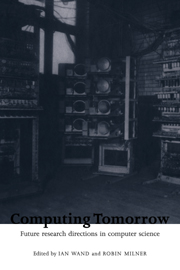Book contents
- Frontmatter
- Contents
- Preface
- Contributors
- 1 The Complexity of Algorithms
- 2 Building Novel Software: the Researcher and the Marketplace
- 3 Prospects for Artificial Intelligence
- 4 Structured Parallel Programming: Theory meets Practice
- 5 Computer Science and Mathematics
- 6 Paradigm Merger in Natural Language Processing
- 7 Large Databases and Knowledge Re-use
- 8 The Global-yet-Personal Information System
- 9 Algebra and Models
- 10 Real-time Computing
- 11 Evaluation of Software Dependability
- 12 Engineering Safety-Critical Systems
- 13 Semantic Ideas in Computing
- 14 Computers and Communications
- 15 Interactive Computing in Tomorrow's Computer Science
- 16 On the Importance of Being the Right Size
- References
- Index
13 - Semantic Ideas in Computing
Published online by Cambridge University Press: 10 December 2009
- Frontmatter
- Contents
- Preface
- Contributors
- 1 The Complexity of Algorithms
- 2 Building Novel Software: the Researcher and the Marketplace
- 3 Prospects for Artificial Intelligence
- 4 Structured Parallel Programming: Theory meets Practice
- 5 Computer Science and Mathematics
- 6 Paradigm Merger in Natural Language Processing
- 7 Large Databases and Knowledge Re-use
- 8 The Global-yet-Personal Information System
- 9 Algebra and Models
- 10 Real-time Computing
- 11 Evaluation of Software Dependability
- 12 Engineering Safety-Critical Systems
- 13 Semantic Ideas in Computing
- 14 Computers and Communications
- 15 Interactive Computing in Tomorrow's Computer Science
- 16 On the Importance of Being the Right Size
- References
- Index
Summary
Introduction
Are there distinct principles and concepts which underlie computing, so that we are justified in calling it an independent science? Or is computing a resource or commodity – like water – which is perfectly well understood in terms of existing science, for which we merely have to find more and better uses?
In this essay I argue that a rich conceptual development is in progress, to which we cannot predict limits, and whose outcome will be a distinct science. This development has all the excitement and unpredictability of any science. We cannot predict how the conceptual landscape will lie in a decade's time; the subject is still young and has many surprises in store, and there is no sure way to extrapolate from the concepts which we now understand to those which will emerge. I therefore support my argument by explaining in outline some semantic ideas which have emerged in the last two or three decades, and some which are just now emerging.
I try to present the ideas here in a way which is accessible to someone with an understanding of programming and a little mathematical background. This volume aims to give a balanced picture of computer science; to achieve this, those parts which are mathematical must be presented as such. The essence of foundational work is to give precise meaning to formulations of processes and information; clearly, we should employ mathematics in this work whenever it strengthens our analytical power. Thus, rather than avoiding equations, I try to surround them with helpful narrative.
It is a somewhat arbitrary matter to decide when a scientific discipline is mature and stands significantly on its own.
Information
- Type
- Chapter
- Information
- Computing TomorrowFuture Research Directions in Computer Science, pp. 246 - 283Publisher: Cambridge University PressPrint publication year: 1996
Accessibility standard: Unknown
Why this information is here
This section outlines the accessibility features of this content - including support for screen readers, full keyboard navigation and high-contrast display options. This may not be relevant for you.Accessibility Information
- 11
- Cited by
